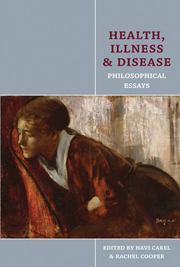Introduction
Summary
At both a social and individual level, securing health acts as a motivating goal for many of us. Public health education schemes tell us we should drink less, use condoms and eat more fruit. Screening programmes aim to catch the early signs of disease while it is treatable. Hand-washing schemes in hospitals aim to stop the spread of infection. At the individual level, too, many of us believe that “health is the most important thing”. We aim to look after ourselves and those we love. Come New Year we join gyms and those of us who still smoke give up smoking, at least for a while. Overall, many (although by no means all) individuals are willing to do much for the sake of their health.
We agree that health matters, but disagree when it comes to determining exactly what counts as health or ill-health. Conditions such as AIDS, cancer and tuberculosis stand out as being fairly clear-cut cases of disorders, but many of the conditions that cause us suffering do not look much like such paradigmatic cases. Increasingly, the conditions for which we seek treatment are not those that straightforwardly lead to suffering and death. Some are “risk factors” – nebulous conditions that might be linked to future ill-health. Certainly we are motivated to reduce our risk factors for disease if the change in habits is something as simple as taking a pill; for example, there are millions of people worldwide who use medication to control their cholesterol level or blood pressure. We are less inclined to reduce our risk factors by cutting back our alcohol consumption.
- Type
- Chapter
- Information
- Health, Illness and DiseasePhilosophical Essays, pp. 1 - 20Publisher: Acumen PublishingPrint publication year: 2012



